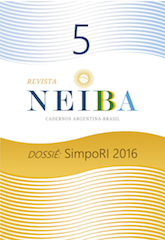O Jus post bellum (justiça após a guerra) nas Relações Internacionais Contemporâneas: Entre a Teoria e a Narrativa
Keywords:
Jus Post Bellum, Intervencionismo Liberal, Perspectivas críticaAbstract
Tradicionalmente, a Teoria da Guerra Justa (TGJ) é concebida por dois conceitos fundamentais sobre conflitos: razões justas para iniciá-lo (jus ad bellum); e formas justas para lutá-lo (jus in bello). Recentemente outro conceito emergiu, sobre as formas justas para se terminar um conflito e a transição para um contexto de paz (jus post bellum - JPB), que analisaremos. Neste artigo pretendemos: a) apresentar os princípios normativos do JPB; b) demonstrar sua aplicabilidade nos cenários pós-conflitos, conforme a literatura liberal humanitária; c) criticar algumas premissas apresentadas por seus teóricos. Desde 1990, intensifica-se uma agenda humanitária de operações de paz e ajuda a Estados não-liberais, sobretudo via ONU. Assim, diversos pesquisadores buscam compreender os limites morais dos atores internacionais no pós-conflito. Então, perguntamos: o JPB surge para auxiliar uma agenda de responsabilidade dos Estados “vencedores” sob os “derrotados”, ou seria funcional corroborando a uma agenda intervencionista das potências internacionais, supostamente benéfica?References
BASS, Garry, 2004. Jus Post Bellum. Philosophy & Public Affairs. 32, 384-412.
BELL, Christine, 2008. On the Law of Peace: Peace Agreements and the Lex Pacificatoria. Oxford: Oxford University Press.
BELLAMY, Alex J, 2009. Guerras Justas: de Cicerón a Iraq. Buenos Aires: Fondo de Cultura Económica.
______. 2008. The responsibilities of victory: Jus Post Bellum and the Just War. Review of International Studies. 34, 601–625.
BOON, Kristen, 2014. The Aplication of Jus Post Bellum in Non-International Armed Conflicts. In: STAHN, C.; EASTERDAY, J S.; IVERSON, J. Jus Post Bellum: Mapping the Normative Foundations. Oxford: Oxford University Press, 259-268.
CHANDLER, David, 2004. The Responsibility to Protect? Imposing the ‘Liberal Peace’. International Peacekeeping, 11, 59–81.
CHAYES, Antonia, 2013. Chapter VII½: Is Jus Post Bellum Possible? The European Journal of International Law. 24, 291-305
DE BRABANDERE, Eric. 2010. The Responsibility for Post- Conflict Reforms: A Critical Assessment of Jus Post Bellum as a Legal Concept. Vanderbilt journal of Transnational Law. 43, 120-149.
______, 2014. The Concept of Jus Post Bellum in International Law: A Normative Critique. In: STAHN, C.; EASTERDAY, J S.; IVERSON, J. Jus Post Bellum. Mapping the Normative Foundations. Oxford: Oxford University Press, 123-142.
EASTERDAY, Jennifer S.; IVERSON, Jens; STAHN, 2014. Exploring the Normative Foundations of Jus Post Bellum: An Introduction. In: STAHN, C.; EASTERDAY, J S.; IVERSON, J. Jus Post Bellum: Mapping the Normative Foundations. Oxford: Oxford University Press, 1-10.
FASSIN, Didier, 2012. Humanitarian Reason: A Moral History of the Present. Translated by Rachel Gomme. Berkeley; Los Angeles; London. University of California Press.
FLECK. Dieter, 2014. Jus Post Bellum as a Partly Independent Legal Framework. In: STAHN, C.; EASTERDAY, J S.; IVERSON, J. Jus Post Belllum: Mapping the Normative Foundations. Oxford: Oxford University Press, 43-58
FOX, G. H, 2014. Navigating the Unilateral/Multilateral Divide. In: STAHN, C.; EASTERDAY, J S.; IVERSON, J. Jus Post Bellum: Mapping the Normative Foundations. Oxford: Oxford University Press, 229-256.
LAZAR, Seth, 2012. Skepticism about Jus Post Bellum. in: MAY, Larry. Morality, jus post bellum, and international law. New York: Cambridge University Press, 204-223.
LEWKOWICZ, Gregory. 2011, Jus Post Bellum: Vieille, Antienne ou Nouvelle Branche du Droit ? Sur le Mythe de L’origine Vénérable du Jus Post Bellum, Revue Belge de Droit International/Belgian Review of International Law. 1, 1-16.
MAY, Larry, 2012. After war ends: a philosophical perspective. Cambridge; New York: Cambridge University Press.
______, 2014. Jus Post Bellum, Grotius, and Meionexia In: STAHN, C.; EASTERDAY, J. S.; IVERSON, J. Jus Post Bellum: Mapping the Normative Foundations. Oxford: Oxford University Press, 15-26.
OREND, Brian, 2000. Jus Post Bellum, Journal of Social Philosophy. 31, 117–137.
______, 2012. Justice After War: Toward a New Geneva Convention, in: PATTERSON, Eric. Ethics beyond war’s end, Georgetown: Georgetown University Press, 175-197
ÖSTERDAHL, Inger; ZADEL, Esther van, 2009. What Will Jus Post Bellum Mean? Of New Wine and Old Bottles. Journal of Conflict & Security Law. 14, 175–207
PARIS, Roland, 2004. At War’s End Building Peace After Civil Conflict. Cambridge; New York; Cambridge University Press.
RICHMOND, Oliver, 2008. Peace in International Relations. New York ; Rutledge.
SARI, Aurel., 2014. The Status of Foreign Armed Forces Deployed in Post-Conflict Environments: A Search for Basic Principles. In: STAHN, C.; EASTERDAY, J S.; IVERSON, J. Jus Post Bellum: Mapping the Normative Foundations. Oxford: Oxford University Press, 467-502.
STAHN, Carsten, 2006. ‘Jus ad bellum’, ‘jus in bello’ . . . ‘jus post bellum’? Rethinking the Conception of the Law of Armed Force. The European Journal of International Law. 17, 921-943.
______, 2014. R2P and Jus Post Bellum: Towards a Polycentric Approach In: STAHN, C.; EASTERDAY, J S.; IVERSON, J. Jus Post Bellum: Mapping the Normative Foundations, Oxford: Oxford University Press, 102-123
VATANPARAST, Roxana, 2014. Waging Peace: Ambiguities, Contradictions, and Problems of a Jus Post Bellum Legal Framework. In: STAHN, C.; EASTERDAY, J S.; IVERSON, J. Jus Post Bellum: Mapping the Normative Foundations, Oxford: Oxford University Press, p. 142-160.
WALDRON, Jeremy, 2002. Post Bellum Aspects of the Laws of Armed Conflict Loy. L.A. Int'l & Comp. L. Rev. 31, 31-55.
WALZER, Michael 2004. Arguing About War. New Haven; London: Yale University Press.
ZAUM, Dominik, 2014 Jus Post Bellum and the Politics of Exit. In: STAHN, C.; EASTERDAY, J S.; IVERSON, J. Jus Post Bellum: Mapping the Normative Foundations, Oxford, Oxford University Press, 334-344.
Downloads
Published
How to Cite
Issue
Section
License
The Copyrights of articles published in Revista Neiba, Cadernos Argentina-Brasil belong to their respective author (s), with the first publication rights assigned to Revista Neiba, Cadernos Argentina-Brasil, with the work simultaneously licensed under a Creative Commons Attribution License, which allows sharing the work with acknowledgment of authorship and initial publication in this journal. Due to the fact that they appear in Revista Neiba, Cadernos Argentina-Brasil, the articles are free to use, with mandatory attribution of authorship, for use in educational and non-commercial applications, according to the terms of the Creative Commons Attribution 4.0 International License adopted by this journal.
This work is licensed under a Creative Commons Attribution 4.0 International License





